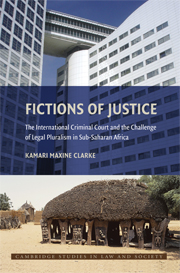 Fictions of Justice
Fictions of Justice Published online by Cambridge University Press: 23 January 2010
PROLOGUE: REINSTATING CULTURAL COMPLEXITIES
In an article titled “A Pluralist Approach to International Law,” Paul Berman (2007) examined the culturalist work of Robert Cover and his emphasis on decentering the role of the state by examining “norm-generating communities” rather than nation-states, as well as the work of Myres McDougal, Harold Lasswell, and Michael Reisman in their attempts to pay homage to different forms of actors engaged in what he described as norm-generating processes. This focus on social processes came to represent the groundwork for what is known as the New Haven School of International Law, which foregrounded the importance of processes and micropractices central to the production of cultural norms. Berman's intervention set the stage for the successors of the core insights from earlier interventions and turns its focus to the work of Harold Koh and others who insist that a new New Haven School is important to effect legal practices in an increasingly complex world (2007a:304). Such a discussion outlines the need for moving from state-centered models to processes that open analytic spaces for understanding changing legal consciousness in a pluralist world.
Coined by Harold Koh, among many, as law and globalization, this new New Haven School has taken on the work of Robert Cover. Berman indicates: “Koh again invoked Cover to explain how an epistemic community was formed around a specific interpretation of the Antiballistic Missile Treaty and the ways in which this community successfully pushed the internationalization of its preferred interpretation into U.S. governmental policy” (2007a:310).
To save this book to your Kindle, first ensure [email protected] is added to your Approved Personal Document E-mail List under your Personal Document Settings on the Manage Your Content and Devices page of your Amazon account. Then enter the ‘name’ part of your Kindle email address below. Find out more about saving to your Kindle.
Note you can select to save to either the @free.kindle.com or @kindle.com variations. ‘@free.kindle.com’ emails are free but can only be saved to your device when it is connected to wi-fi. ‘@kindle.com’ emails can be delivered even when you are not connected to wi-fi, but note that service fees apply.
Find out more about the Kindle Personal Document Service.
To save content items to your account, please confirm that you agree to abide by our usage policies. If this is the first time you use this feature, you will be asked to authorise Cambridge Core to connect with your account. Find out more about saving content to Dropbox.
To save content items to your account, please confirm that you agree to abide by our usage policies. If this is the first time you use this feature, you will be asked to authorise Cambridge Core to connect with your account. Find out more about saving content to Google Drive.